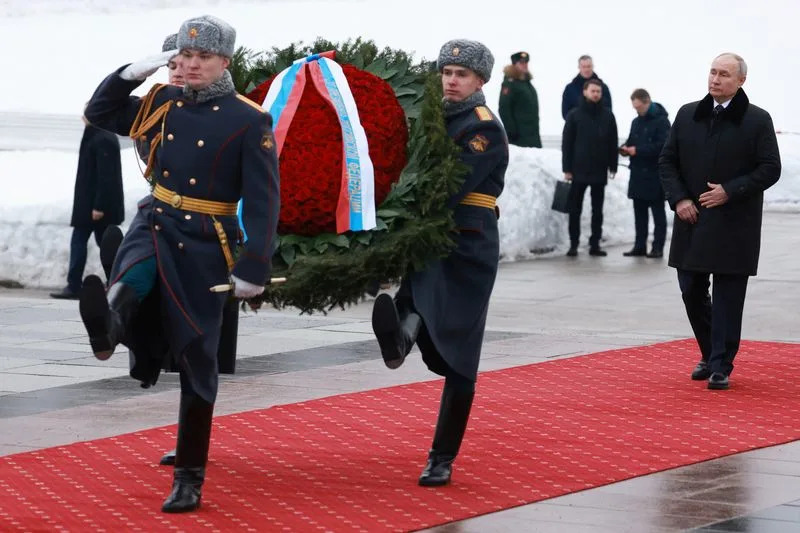Alexander Lukashenko, self-proclaimed President of Belarus, has claimed at a meeting with Russian President Vladimir Putin that Ukraine and Baltic countries "could cooperate with Russia instead of ‘seeking a better life abroad’".
Lukashenko and Putin at a meeting on January 28.
Source: Lukashenko and Putin at a meeting in St Petersburg, as reported by the Pul pervogo Telegram channel and Russian media outlet Interfax
Quote from Lukashenko: "I thought – which country could provide such opportunities to such a country as Belarus? We do not see any issues with Russia… No [other] country would be able to treat Belarus the way you do.
So I’m thinking: what prevents Ukraine and the Baltic countries from cooperating with us like this? This is our world, we have been building it for several decades, we won that horrible war [WW2 – ed.] together. So let’s move in this direction. But no, they don’t want to, they seek a better life abroad."
Details: Lukashenko also said that he thinks Ukraine will "come back" to Russia and Belarus.
At the opening of a monument in Leningrad Oblast to mark the 80th anniversary of the liberation of Leningrad from the siege, Lukashenko said "it would be great if someone from Ukraine was standing here too".
"Three Slavic nations have suffered. But they are absent. What can we do? It’s their choice to take a different path. But I think they will come back to us. They will have no other option," Lukashenko said.
Putin, in his turn, claimed at the beginning of the meeting with Lukashenko in the Konstantinovsky Palace in St. Petersburg that they would discuss the war against Ukraine.
"Of course, today during our conversation I will inform you in detail about what is happening in the special military operation zone," Putin told Lukashenko.
ISW points out Russia's efforts to shape information sphere to justify its aggression in other countries.
Analysts from the Institute for the Study of War have suggested that the Kremlin continues to rely on the "compatriots abroad" concept to justify possible aggression against the Baltic States and other NATO member-states.
Source: Institute for the Study of War (ISW)
Details: Analysis of available data shows that Russian President Vladimir Putin, self-proclaimed president of the Republic of Belarus Alexander Lukashenko and Kremlin officials said that Russia is enmeshed in an existential geopolitical conflict with an alleged "modern Nazi movement" that extends beyond Ukraine during the celebrations of the 80th anniversary of the breaking of the siege of Leningrad.
"Putin has long tried to construct an ideology for Russia that he can use to support a geopolitical confrontation with the West reminiscent of the Cold War, and the Kremlin may increasingly use existing rhetoric about fighting Nazism to support this effort," the ISW wrote.
The Kremlin has called for the "denazification" of Ukraine in an effort to undermine the current government and has used information operations about Ukrainian "Nazis" to shroud its unprovoked invasion of Ukraine in the myths of the so-called Great Patriotic War.
Russian officials had previously also levelled the "Nazi" label against Western states beyond Ukraine, though the likely coordinated rhetoric of Putin, Lukashenko, Russian Foreign Intelligence Service Director Sergei Naryshkin, and Russian State Duma Chairman Vyacheslav Volodin on 27 January "suggest[s] that the Kremlin may increasingly label any perceived adversary and possibly the entire West as ‘Nazi’," the ISW wrote.
The ISW report continued: "The Kremlin may have decided that the simple narrative that Russia and other states are fighting a geopolitical Nazi force is a more effective immediate narrative line than Putin’s attempt to appeal to Russian citizens and Russian speakers in the territory of the former Soviet Union and Russian Empire with the ideology of the ‘Russian World’ (Russkiy Mir), which is based on purposefully amorphous ethnic identities that are not agreed upon and that are at odds with Russia’s multi-ethnic composition."
The ISW analysts also stressed that Putin’s accusation that the Baltic States have adopted "Nazism" might be part of the Kremlin’s ongoing efforts to set the stage for future Russian aggression against NATO members.
The ISW’s data indicates that Putin has claimed that the Baltic States have designated thousands of their residents "subhuman," are "depriving" them of their "most basic rights", and are subjecting them to "persecution".
The Kremlin has historically used its concept of "compatriots abroad", which vaguely includes ethnic Russians and Russian speakers of other ethnicities, to justify Russian aggression in neighbouring states.
The ISW "continues to assess that Kremlin officials and mouthpieces may be attempting to set information conditions for possible future Russian aggression in the Baltic states – and other NATO members, such as Finland – under the guise of protecting Russia’s ‘compatriots abroad’."
To quote the ISW’s Key Takeaways for 27 January:
-
Russian President Vladimir Putin, Belarusian President Alexander Lukashenko, and Kremlin officials claimed that Russia is in an existential geopolitical conflict with an alleged modern Nazi movement that extends beyond Ukraine while marking the 80th anniversary of the breaking of the siege of Leningrad.
-
Putin has long tried to construct an ideology for Russia that he can use to support a geopolitical confrontation with the West reminiscent of the Cold War, and the Kremlin may increasingly use existing rhetoric about fighting Nazism to support this effort.
-
Putin specifically accused the Baltic states of adopting "Nazism," likely as part of continued Kremlin efforts to set information conditions for future Russian aggression against NATO members.
-
Myanmar banks reportedly connected to the Russian System for the Transfer of Financial Messages (SPFS) banking system, a Russian analogue for the Society for Worldwide Interbank Financial Telecommunications (SWIFT) banking system.
-
Russian forces conducted a limited series of drone and missile strikes against Ukraine on 26 and 27 January.
-
Russian authorities are likely blocking communications in the Sakha Republic for the fourth consecutive day following 24 January protests in support of a Russian citizen allegedly murdered by a naturalised Russian citizen from Tajikistan.
-
Russian forces made recent confirmed advances near Kupiansk, Kreminna, and Avdiivka amid continued positional engagements along the entire line of contact on 27 January.
-
UK outlet The Telegraph reported on 26 January, citing an unnamed Western official, that Russia is spending roughly 40% of its GDP on the war in Ukraine, more than Russian national spending on health and education.
-
Russian federal subjects continue to establish patronage networks with occupied areas of Ukraine.
Lukashenko invites Putin to join him on trip to Antarctica
Self-proclaimed President of Belarus Alexander Lukashenko (left) and Russian President Vladimir Putin (right).
Self-proclaimed President of Belarus Alexander Lukashenko has invited Russian President Vladimir Putin to join him on a trip to Antarctica, and Putin has agreed.
Source: Pul Pervogo, a Belarusian Telegram channel; Zerkalo, a Belarusian news outlet
Details: During a video call, Putin and Lukashenko watched as Russian polar explorers at the Vostok station in Antarctica opened a new wintering complex.
Lukashenko was so impressed that he suggested that Putin join him on a trip to Antarctica. When Lukashenko said: "Let’s go some time? Looks interesting!" Putin replied: "Yes, okay."
Background:
-
The International Criminal Court (ICC) issued arrest warrants for Russian President Vladimir Putin and Maria Lvova-Belova, the Russian Presidential Commissioner for Children's Affairs, on 17 March 2023.
-
All member states of the International Criminal Court are legally bound to detain Putin, now deemed a suspect, and hand him over to the court. Marco Buschmann, the German Justice Minister, said that he would execute the arrest warrant for Russian President Vladimir Putin if he sets foot on German soil.
-
Russia said that the ICC "has no power" on the territory of the Russian Federation.
Russia's Putin derides 'Russophobia' in Europe at World War Two memorial
Russian President Vladimir Putin castigated Europe on Saturday for "Russophobia" and criticized the Baltic States over human rights at the unveiling of a World War Two memorial.
Since he sent Russian troops into Ukraine nearly two years ago, Putin has been making comparisons with the fight against the Nazis in order to rally his nation.
"The regime in Kyiv exalts Hitler's accomplices, the SS men ... In a number of European countries, Russophobia is promoted as state policy," Putin said in the Leningrad region for the 80th anniversary of the end of the Nazi siege.
The Germans' aims then were to steal the Soviet Union's resources and eliminate its people, he said.
Ukraine, which was part of the Soviet Union and itself suffered devastation at the hands of Hitler's forces, rejects comparisons as spurious pretexts for a war of conquest.
In his speech, Putin also lambasted the Baltic States over human rights. Estonia, Latvia and Lithuania - ruled from Moscow during the Cold War but now members of the European Union and NATO military alliance - have been among the strongest critics of Russia's invasion of Ukraine.
"In the Baltic states, tens of thousands of people are declared subhuman, deprived of their most basic rights, and subjected to persecution," Putin said, referring to migration crackdowns. Moscow has repeatedly accused the Baltic nations of xenophobia and treating Russian minorities as "second-class".






